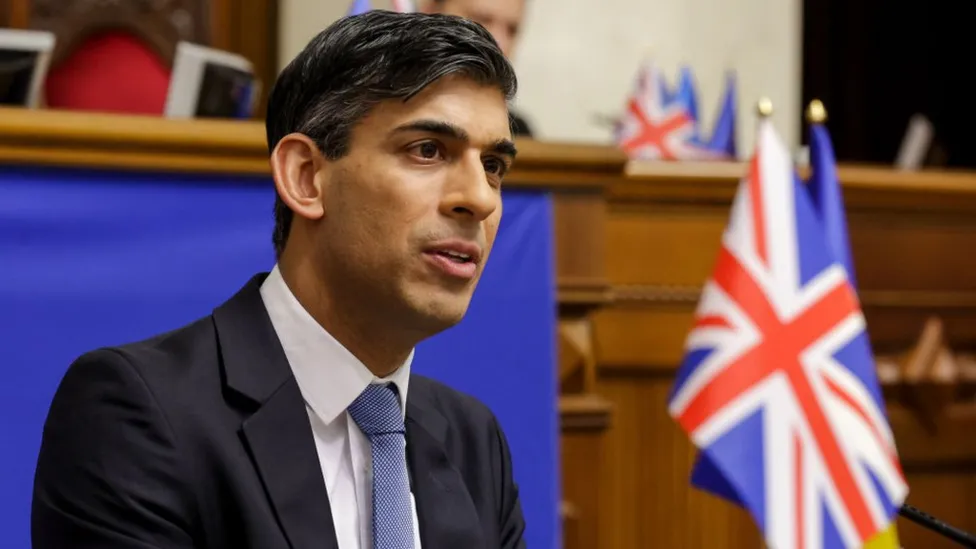Rishi Sunak is to address MPs for the first time since the UK joined US strikes on Houthi targets in Yemen.
Mr Sunak said Thursday's strikes had been “limited” and “necessary” to protect lives and commercial shipping. The PM authorised the action without consulting Parliament, prompting criticism from some in opposition.
Following the strikes, the US said it shot down a missile fired at one of its warships from a Houthi area of Yemen on Sunday, with no injuries reported. It is the latest in weeks of attacks in the Red Sea by the pro-Hamas Houthis, who say they target ships linked to Israel.
The group's attacks on cargo ships – some of which have no clear connection to Israel – have led major shipping companies to divert vessels away from the Red Sea, instead taking a longer route around southern Africa.
Mr Sunak will deliver a statement about the strikes, which targeted Houthi command, storage, and launch facilities, in the House of Commons later. The Houthis are a political and military group which control a large part of Yemen, including the capital. They are backed by Iran, Israel's arch-enemy.
Following the strikes, Mr Sunak said the Houthi attacks had been “risking lives at sea… causing major disruption to a vital trade route and driving up commodity prices”.
“We have therefore taken limited, necessary and proportionate action in self-defence… to degrade Houthi military capabilities and protect global shipping,” he said. This is the first time Mr Sunak has decided to take part in military action since becoming prime minister in October 2022, making Monday's statement a significant political milestone for him.
Conservative MPs have generally been supportive of Mr Sunak's decision over the weekend though he is likely to face questions today about whether the UK will take part in further strikes and what plans the government has to avoid a broader regional conflict.
The government is not legally required to seek parliamentary approval before taking military action. However, a convention has been established in recent years under which the Commons is – in most circumstances – given the opportunity to debate the deployment of military forces in advance.
Foreign Secretary Lord Cameron told the BBC on Sunday that “operational security” made it necessary to proceed without a vote.
But Liberal Democrat foreign affairs spokeswoman Layla Moran said Parliament had a “right to debate and vote on military action”, and former Labour leader Jeremy Corbyn said it was “utterly disgraceful that Parliament has not even been consulted”.
Asked on the Sunday with Laura Kuenssberg programme about the criticism, Lord Cameron said Mr Sunak had “followed all the correct procedures”, including “assembling ministers, listening to legal advice, consulting with allies”.
“I don't think it would have been right to have a debate and a vote before this sort of action, because I think it is important for reasons of operational security to, on this occasion, take the action and then have a statement in Parliament afterwards.”
Speaking on the same programme, Labour leader Sir Keir Starmer, who was briefed ahead of the strikes, said Labour supported the action, but there needed to be a debate in Parliament.
Asked about a previous pledge that he would pass a law requiring the government to hold a vote before taking military action, Sir Keir said there was a “huge distinction” between a limited operation like that carried out in Yemen and a “sustained campaign [of] military action, usually involving troops on the ground”.
“National security must come first,” he said. “There will always be urgent situations where Parliament can't be consulted beforehand.” He said there should be votes on any “sustained campaign”, including deployments of ground troops.
Defence Secretary Grant Shapps is also expected to set out a series of measures intended to deter threats to the UK and bolster the country's defences.
In a speech at Lancaster House in London on Monday, Mr Shapps will announce that 20,000 personnel from the British armed forces will be sent to multiple European countries as part of the largest Nato deployment since the end of the Cold War.
They will join thousands of personnel from the 31 Nato allies and Sweden, which is currently in the process of joining the bloc.
“Today our adversaries are busily rebuilding their barriers. Old enemies are reanimated. Battle lines are being redrawn,” Mr Shapps will say.
“We must be prepared to deter our enemies, prepared to lead our allies and prepared to defend our nation whenever the call comes.”
— CutC by bbc.com


